Women Leaders Winning Thru' The Covid Gridlock

How did India’s women leaders deal with the COVID-19 compelled lockdown challenge? As the world came almost to a halt, how did they tackle the twin tasks of keeping themselves and their teams motivated, while discovering and pursuing new opportunities? India’s women leaders from various sectors shared notes on how they found workable solutions, and even came out with positive outcomes…
Survive, reverse and thrive
Sulajja Firodia Motwani
- Founder & CEO, Kinetic Green & Power Solutions Ltd
Sulajja Firodia Motwani is currently the Vice Chairperson of Kinetic Engineering Limited and Founder & CEO of Kinetic Green Energy & Power Solutions Limited. Having founded the new age business model to build e-vehicles and now tweaking them to make them suitable for e-spraying and e-fogging public and commercial spaces during this Covid crisis, she speaks about how she took up the challenge overpowering the lockdown

The COVID-19 pandemic and the subsequent lockdown came as a big surprise to everyone. Nobody was really prepared for such a crisis. For us, things accelerate in the month of March as we plan for the next year, so the lockdown put all plans in disarray.
Kinetic Green has been founded as per the new-age business model, where a lot of component manufacturing is outsourced to strategic business partners but the design, marketing, assembly, quality, branding and focus are done in-house. Being a green energy company, we have a lot of enthusiastic young people in our company and when the lockdown was declared, we had to first ensure that their morale was not lost.
The good part was that ours is not a debt-burdened company as I had put in my own equity money to start my company, and we had no burden of fixed wages too. We straightaway began Work From Home (WFH) and got on to the digital meeting platform. Every day at 11 am, a meeting was held with a core group of 15 people and in the afternoon we had project reviews and financial preparation with the relevant teams in order to take stock of our costs and reduce the cash burden. We put off those projects by six months, which in this new environment would not pay us dividends.
Post Covid, the strategy has to be to survive, reverse and thrive. We asked our employees to give their suggestions in this changing scenario and ensured that work was not paralysed but going ahead with caution.
We also had reviews to aggressively reduce overhead costs and material costs without compromising on the quality for the customer. Cash generation was important, so we worked towards it by keeping data ready to get back GST and TDS from the government as well as our fixed deposit interests.
We realised that passenger rickshaws would get affected, as migrants had returned to their villages, customer demand would be adversely affected, and dealers would take time to bounce back. So we built up other segments by launching new models of electric three-wheelers mounted with e-sprayers and e-foggers so that they could spray and sanitise slums, public gardens, IT Parks, parking areas of factories and so on. We also launched mobile spray vans. We expedited the manufacture of e-delivery vans for e-commerce companies which are booming. We launched our electric bicycles too which are being used by huge industrial campuses like Tata Motors as people are hesitant to use public transport within the factory premises.
“Even post- Covid, we could probably be hit by something uncertain so the new learning is that one must remain agile’’
The new normal is that one must go slow as things are uncertain. Even post-Covid, we could probably be hit by something uncertain so the new learning is that one must remain agile, able to tweak a change or make a fundamental change and go light on your cost. If such a thing happens again, my entire Head Office can work from home, but the plant has to keep running. So we have to organise ourselves very well by ensuring safety and social distancing at the plant.
I feel the Covid impact on me is so much that I feel that one doesn’t know what is around the corner. We have abused nature, environment and resources and adopted unethical food practices. So there is risk and insecurity about what the human race is doing to the planet.
From my side, I must reduce my footprint through sustainable living by using solar energy instead of electrical energy, reducing the use of water, having vegetarian food and giving value to relationships. I found great comfort in close relationships, be it home or place of work during this lockdown. I never missed parties and socialising, as I enjoyed simple pleasures of life like having my son come down from the USA and spending a lot of time with him. I think we all should stay hopeful and good.
- Vinita Deshmukh
We learnt new ways to work
Lila Poonawalla
- India’s first Woman CEO in the engineering sector, former Chairman & MD, Alfa Laval and Founder, Lila Poonawalla Foundation
Lila and Firoz Poonawala, founders of the Lila Poonawalla Foundation which provides scholarships to needy girls to pursue their schooling, under-graduation or post-graduation and to date have offered nearly 10,000 scholarships, took the COVID-19 lockdown crisis in their stride and smoothly adopted the virtual way of working

When the lockdown started in March, it was too early for girls to apply for scholarships. However, when we realised it would be a longtime affair, we started the process of shifting computers to the homes of our girls who work in our administrative office. I must say the Pune Police were very co-operative to help us in this process. We also bought software required to access our servers and work from home began in right earnest.
We changed our way of working by accepting scanned copies of receipts (instead of physical copies for which they had to visit our office) to claim their scholarships. Our girl in Wardha who had to go back home due to the lockdown perfectly managed the e-receipts of girl scholars from Wardha, Amravati and Nagpur. We re-organised ourselves very well and work has become easier now.
We embarked upon another philanthropic mission. Parents of our girls being daily wage workers, we opened a separate account by putting in our funds and that of our friends and distributed monthly grocery bags to 1400 families. Firoz personally distributed them. We were not afraid to stir out for distributing these packets we took all the care required to be safe from contracting COVID-19.
“All the meetings were done through online conferencing. Of course, it is nice to physically meet but we can manage to do good work without it too’’
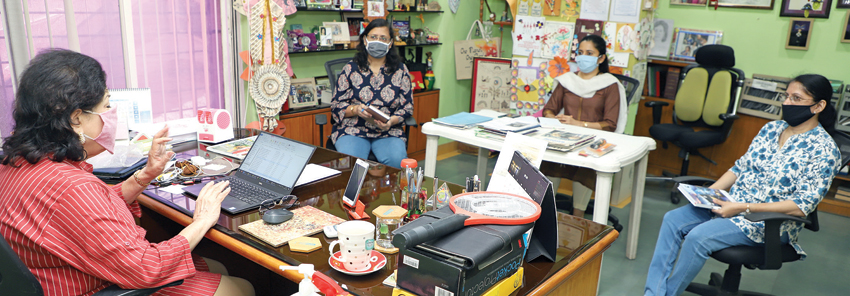
Our office is spruced up to ensure health safety in these Covid times. Visitors have to ring the bell after which our ‘Corona Buddies’ ensure they are provided masks and sanitizers. The washrooms only have paper towels and at seven am every morning, the entire office is sanitized and once a fortnight we call a professional to sanitise our entire office. We celebrated a virtual Firoz’s 84th birthday and our golden wedding anniversary amidst the lockdown with our girls too, which was fun.
We have learnt a new way to work and it saves money, energy and does not pollute the environment. In the pre-corona times, I would have visited Sweden thrice, Delhi thrice, Mumbai twice and Nagpur twice by this time. However, all the meetings were done through online conferencing. Of course, it is nice to physically meet but we can manage to do good work without it too. And yes, for 50 years, I had hardly done any housework but I’m proud that I could manage it without any pain. We also did gardening and I’m happy to say that our garden has blossomed with myriad blooms.
- Vinita Deshmukh
Lending a helping hand to Covid warriors
Sucheta Dalal
- Managing Editor, Moneylife financial daily magazine and Founder, Moneylife Foundation
Sucheta Dalal, among the best known financial journalists in India, was awarded the Padma Shri for her outstanding investigative journalism in unearthing the Harshad Mehta scam, CR Bhansali scam and Enron, among others. She was Financial Editor at The Times of India. She is the Managing Editor of Moneylife financial daily news magazine and founder of Moneylife Foundation, which campaigns for financial literacy amongst individual investors and fights for their causes. Here, she narrates the work of her magazine and foundation during the Covid crisis, which involved providing safety gear for Mumbai’s Covid warriors

On the editorial side, we were very fortunate that Moneylife magazine had gone fully digital in 2017. We had expected to be able to continue working since media was exempt under essential services. However, with public transport closed, it was not feasible for all. The switch was smooth for us, most colleagues had computers at home, a couple of them took office laptops home. We use Facebook’s workspace extensively, which works for both the editorial and Moneylife Foundation to have continuous engagement, like in an office. Some key persons have been coming to the office after the partial lockdown was lifted but not every day, and that too for a few hours for banking, online filing and postal work.
As for Moneylife Foundation, we initially worked with other NGOs on Covid Relief but when NitiAyog permitted Darpan registered NGOs to do Covid Relief work irrespective of our charter, we decided to dedicate a few months to this much-needed work. Many of our regular donors were also keen to donate to us directly. By then, it was clear that hospitals and healthcare workers needed us the most. We were fortunate to have doctors like Dr Neela Patwardhan connect us to hospitals in Mumbai. The Thakur Foundation got us going. We created a WhatsApp group to receive, collate and manage requirements efficiently. The group kept expanding as some wonderfully dedicated doctors joined in and also helped extend our reach. We have about 15 hospitals in the group now and through them some rural health centres as well.
The relief work has been one long learning curve about dealing with rampant profiteering in the face of a pandemic. It ended up with advocacy and a public interest litigation in the Bombay High Court to seek capping of N95 masks where profiteering was the worst and pushing Mumbai municipal corporation to cancel a tender for super-expensive body bags. Consider the difference. The municipal corporation had bought bags for Rs.6700 as against our cost of Rs.201 from a supplier to the municipal hospitals, which makes them to the hospital’s specification. Remember these body bags only need to be sturdy, leak-proof and carry a body from the hospital to cremation a matter of a few hours! They are not for overseas transportation or use in war times!
“The relief work has been one long learning curve about dealing with rampant profiteering in the face of a pandemic’’
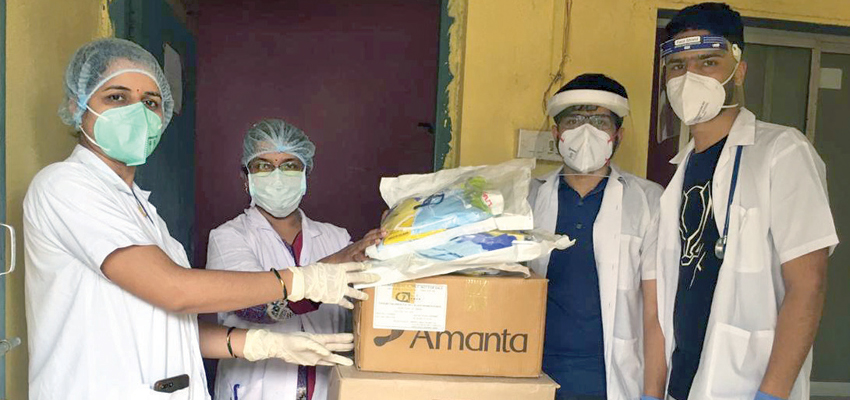
As for our strategy, we are proud of our collaboration with Ayu Devices and Dr Ranganath Jawahir to be able to provide smart digital Covid OPDs that allowed no-touch initial examination at six leading hospitals. This suggestion came from Dr Avinash Saknure, a resident doctor at Sion Hospital and MARD office bearer. Each of these cost Rs.2.5 lakhs and we have our generous donors to thank for making this possible. Very soon, we were providing body bags, oxygen masks with reservoirs, expensive life-saving immune suppressants (Tocilizumab), oxymeters, infrared thermometers, disposable sheets, operating theatre caps, cleaning gloves, paper bags etc. anything that was an immediate need.
As for the ‘new normal’, I would say the transition has been very smooth for Moneylife magazine. We have always had a digital and social media presence. At Moneylife Foundation, we have been rather overwhelmed with the relief work we had expected to do this for two months and thought, like everyone, that a lockdown would help us beat the virus. Three months later, we are not clear where we are headed. But our regular work has taken a backseat and we are gradually working at getting back to our core area. The government and the Mumbai municipal corporation has enormous funds and three months is long enough for the government to get its act together. And things have in fact improved considerably. So by July, it will be back to our financial literacy work.
Philosophically and individually, the big learning is not to take anything for granted and to be very thankful to God that we are fortunate enough to be able to carry on. It is our duty to ensure that we lend a helping hand to those who are leading the war against this pandemic and those who have not been as fortunate! The misery faced by the poorest has been heart-breaking. They continue to suffer we need to fight for a fairer deal for them.
- Vinita Deshmukh
Working at 80% higher efficiency
Rajeshwari Chandrasekar
- Chief of Field Officer, UNICEF, Maharashtra
Rajeshwari Chandrasekar, Chief of Field Officer, UNICEF, Maharashtra, was earlier posted in Kenya and Jakarta. The organisation has lent a helping hand to the municipal corporations of Mumbai and Pune to tackle the unprecedented Covid-19 crisis, and remarkably done so through the virtual platform, both in terms of supply of ventilators, community based hygiene equipment and training for the relevant civic authorities

Maharashtra, is one of the first states to declare a lockdown sometime in mid-March, I had to take a decision to implement the Work From Home (WFH) strategy for our Mumbai office, even before our country headquarters of UNICEF did so. Before closing the office, I realised I needed to boost the morale of the staff, particularly those who serve us tea and keep our office clean. I assured them that they would be given their salaries even if they had to stay at home. Communicating with the rest of my staff, I asked them not to come to the office but we would find a mechanism to work. So we worked around their solutions like fixing their laptops or mobile phones to ensure that they managed to continue working with the service one can give and maintained their morale. Every Thursday, I host an online conference to know what’s latest from everyone on the official as well as their personal front. Apart from me, others, when required, also send out requests for a Zoom call. So, we have become adept with this new technology.
Because of Covid, UNICEF received funds from donor countries and from philanthropists. Maharashtra, being the biggest hot spot, I decided to mobilise resources. We received a generous grant of Rs.1.6 crore from DBS Bank, Singapore. We channelised these funds to help procure ventilators (which at that time were in short supply) for Brihanmumbai Municipal Corporation run hospitals and provide training to the municipal officials of those hospitals on infectious disease prevention control.
“In this ‘new normal’, I think efficiency has increased by 80%. That’s because the time of travel to and fro has been saved’’
With the DBS Bank grant, we provided pedal generated hand-washing stations to Asia’s largest slum, Dharavi where 90,000 people live per square mile, as also to 13 dispensaries/hospitals of the Pune Municipal Corporation. At Dharavi, we installed the stations, while the BMC spends for the detergent and employs community volunteers to operate them. Presently, we are training municipal officials of Mumbai and Pune on how to maintain infection prevention control. That training would be over by the end of August. We are also getting requests from Yerawada Central Prison and Arthur Jail and an orphanage. We are working towards it.
In this ‘new normal’, I think efficiency has increased by 80%. That’s because the time of travel to and fro has been saved and in face-to-face contact, warming up and other formalities take up a lot of time. With virtual contact, you straightaway talk business and move on to your work.
Covid-19 has taught me that life is all about inter dependability. As a leader, it has impacted me and on what my team does. It is not about bossing around I have set an example and they will also follow the leader.
- Vinita Deshmukh
The Miracle Teacher
K. K. Shailaja
- Minister of Health, Social Justice and Women and Child Development of Kerala state

Amid the corona threat that shook the entire world, Kerala’s stringent measures are being praised globally. Kerala’s Health Minister K. K. Shailaja or Shailaja Teacher, as she is affectionately known by her followers, is now being called the coronavirus slayer. The 63 year old minister is hailed as a rock star who has shielded a state of 35 million from the major threats to health. The establishment of a rapid response team and control rooms in the 14 districts of Kerala under her watch has played a huge role in turning the tide for Kerala
“We have broken the chain to a great extent the number of new cases have kept reducing implying that the viral load has become less’’
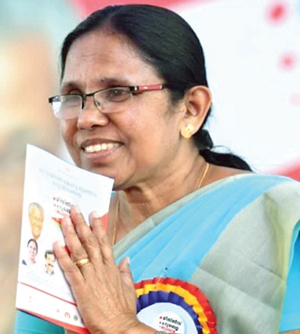
It has not been easy at all. It was a herculean task to check on all the people who were arriving in the state from outside, put them in quarantine… This might sound simple, but the arrangements were not easy. Eighteen expert groups were assigned each task such as contact tracing, isolation, logistics collection, the mental health of patients, transport, finance, etc. There is even a group that teaches people the protocol for burying a body if someone dies from COVID-19. I first read about the virus spreading on the Wuhan University premises. I read that the virus is SARS (Severe Acute Respiratory Symptom) and there was MERS (Middle East Respiratory Symptoms) from the same virus family and they later named it COVID-19. Whatever the name, the virus was dangerous and its infectivity was high.
We didn’t stop surveillance at the airports. Health workers continued testing passengers with thermometers. Some people even asked why we should continue the checks, saying we were creating panic, that we were overdoing it and people would make fun of us. Even the opposition said in the Assembly that we should look at what the US is doing. My reply was that we can’t let the people of the state die, we will not follow anyone but learn lessons from all. We had a standard protocol that we set for the state, though we follow the WHO guidelines as well.
Our knowledge and experience told us that it was not the time to step back, and we didn’t. Later, COVID-19 was declared a pandemic whereas we had started precautions way back, foreseeing that it would turn out to be a pandemic. We got things done through teamwork, sharing the burden as well as happiness. I view my officials as family. I scold those who fail in their duty and appreciate those who work hard. The appreciation makes the staff more sincere, they feel free to call me at any time.
We have flattened the curve with strict screening, quarantine, isolation and treatment. But we can’t say that we have broken the chain fully because positive cases are still there. We have broken the chain to a great extent the number of new cases have kept reducing implying that the viral load has become less.
- Neeraj Varty (Compiled from BBC news and www.thenewsminuite reports)
Opportunity in a crisis
Kiran Mazumdar-Shaw
- Chairperson and Managing Director, Biocon Ltd
From ramping up indigenous testing, developing our ventilators and playing a pivotal role in getting Covid-19 vaccination to everyone in the world, the challenges and the adversity of the pandemic has actually created opportunities for India, says Kiran Mazumdar-Shaw
“After IT, the pharmaceutical and healthcare industry in India has the biggest opportunity to become the next big sector of global dominance’’
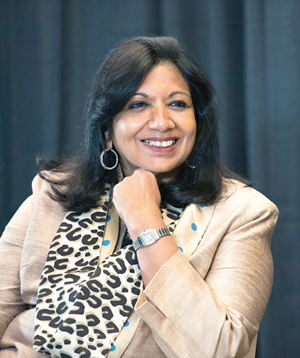
In early March, when the Covid crisis struck India, we had to rapidly respond to manage the crisis. There was an urgency to test suspected Covid-19 patients and at that point in time, we had a shortage of testing kits. RT PCR testing was the prescribed method of testing and we simply didn’t have enough of them. Although government hospitals and research institutions were in a position to do RT PCR testing, the fact was that they could conduct a maximum 10,000 tests a day for the country as a whole. This became a huge challenge and we realised that with the surging numbers in the US, India would have rationing of testing kits, which we were so dependent upon from overseas.
India is one of the largest producers of vaccines in the world. The country produces three billion doses of which one billion is used in India and the remaining two billion are exported. This is the scale at which we are doing things in India. As the world is racing towards producing the vaccine against COVID-19, India can become a very important strategic partner in this sector. Many of the Indian vaccine producers have entered into collaborations and partnerships to develop vaccines for this global pandemic. Therefore, India has the opportunity to become even larger in terms of vaccine production because post-Covid, the world will need huge volumes of vaccines, at the lowest cost. Post-Covi d , there will be huge challenges for the global healthcare sector to reduce costs.
After IT, the pharmaceutical and healthcare industry in India has the biggest opportunity to become the next big sector of global dominance. We have a very large talent base, whether it is of medical professionals, scientific researchers or biomedical engineers and other engineering requirements that can make it very sustainable and of global scale.
- Neeraj Varty (Compiled from news reports)
Getting used to the new normal
Dr. Ankita Singh
- Senior Vice President and Global Head of HR, IT, Travel and Admin at CIGNEX Datamatics
The COVID-19 outbreak has flabbergasted every human with its wrath. With an intent to overcome this pandemic, CIGNEX Datamatics devised a cut-through plan which is built on the foundation of communication, transparency and trust. Dr Ankita Singh shares her first-hand experience of leading her team during these uncertain times
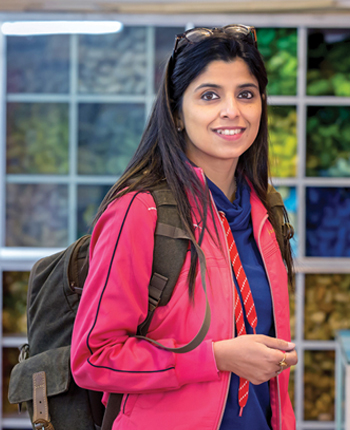
We ought to find the balance, especially when things around us are so uncertain, out of our control and chaotic. This could be achieved by embracing the situation and giving our best to overcome it. To sail through this turmoil, we need to stay optimistic. This situation has taught me to be hopeful about the future and grateful for what I have.
At CIGNEX Datamatics, we managed to shield our business by simply following the method of CARE (Communicate, Adapt, Relate and Empathise). We devised a three pronged approach. Firstly, taking care of our employees and their well-being. Secondly, business continuity, as clients have consistently believed in us, and lastly, our culture, which we strongly believe in. We have always been transparent with our employees and have assured them that the crisis is being handled in a meaningful way. We have walked the talk. They know and believe that we are all together in it and when you have a strong supporting team, handling any situation with positivity becomes attainable.
We adapted a few strategies but didn’t change just because everybody was. We revisited and reviewed all our processes and refreshed or rebooted wherever we were required to meet the needs. We focused on finding the right mix that suits our people business and culture. Our strategy was and is to go in a phased manner. We defined four stages: survival, continuity, productivity, and sustainability. We have still not reached level 4 but that’s fine with us, as we would never compromise on our people’s well being and quality of our services.
“We focused on finding the right mix that suits our people business and culture. Our strategy was and is to go in a phased manner’’
The revelation of getting used to the ‘next normal’ made us ponder on the ways to adopt this situation. Frankly, there aren’t any guidelines or strategies that could be followed in this phase for us. The scenario is such that a new ‘new’ will be defined almost every day.
All through this, we realised that change is the only constant thing. Hence, I urge people to invest in themselves, give time to loved ones, and remain hopeful! As Albert Einstein rightly said, ‘Life is like riding a bicycle. To keep your balance, you must keep moving.’ This too shall pass!
- Ekta Katti
“Purposeful digital transformation and collective progress”
Vinita Gera
- Senior Director & GM, Dell Technologies India COE
The Covid-19 crisis and the long period of lockdown has taught her not to take anything for granted, says Vinita Gera, Senior Director & GM, Dell Technologies India COE. She does believe that we will evolve to a balanced work culture more mature and more advanced than before. Talking to Corporate Citizen, Vinita elaborates on what she did for a positive outcome through the ongoing crisis period
“Everything virtual, high efficiency, using technology to maintain business as usual and maintain a highly collaborative and engaging workforce is our new normal’’
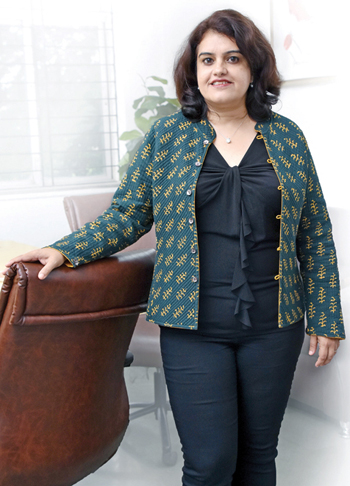
With positivity and work efficiency through the lockdown, a lot of it is in the mind and based on your optimism and willingness to adapt. Like any other habit, the new normal took its time to form. However, given the fact that we do not have complete control over the situation, our reaction is what we can control for a positive outcome. So it then calls for giving your reaction the best shot.
Remote working is not a new concept for us, and we have advocated this culture for more than a decade. The only difference is that while earlier people connected remotely in fewer numbers, now it is everyone. So virtual meetings have become a norm for every conversation, and we are using technologies more effectively than we did earlier.
We did focus a lot on ensuring we did not stop the programs and the work that we did in the old world and made every attempt to go digital on everything that we do. Our employees can even continue to volunteer for social causes in a virtual setting, staying true to our endeavours in giving back to the community. Almost all things engagement in the pillars of learning, innovation, volunteering, fun, are now digital. Not allowing ourselves to be completely disrupted by the lockdown was an important strategy that helped us.
Everything virtual, high efficiency, using technology to maintain business as usual and maintain a highly collaborative and engaging workforce is our new normal.
Looking at work culture ahead, remote working will become more common than before. Employees based on-site, after all this is behind us, will be more cognizant to including the remote workforce. I do think we will evolve to balanced work culture, more mature and more advanced than before.
The Covid-19 crisis has taught me not to take anything for granted, that one thing can disrupt many lives. I wouldn’t have imagined witnessing a lockdown, especially the way it was in the initial two months. I’m now more evolved than earlier on introspection, patience, fitness and adaptability.
- Rajesh Rao
Compassion and empathy ensures 100% staff strength
Minnie Bodhanwala
- CEO of Nowrosjee Wadia Maternity Hospital and Bai Jerbai Wadia Hospital for Children, Mumbai
Minnie Bodhanwala is also a board member and director of several Wadia Group organisations and companies. Running twin services of a maternity hospital and a paediatric wing, she and her staff had to walk the razor's edge following the pandemic outbreak. Wadia Hospital, along with BYL Nair and Sion hospital has been at the forefront of handling deliveries involving Covid-19 positive mothers
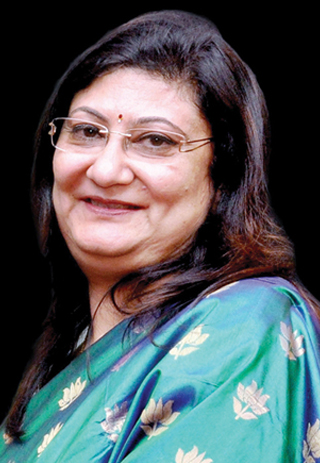
The onset of the lockdown resulted in running our hospital at 50% of our total strength of 1500 employees. Our staff were also apprehensive about working with Covid patients. The lack of clarity in handling the virus strain added to the underlying risks for both, patients and staff.
Connecting with the staff has been my mantra in motivating and ensuring stable staff strength. Constant mentoring and counselling of all healthcare workers and non-medical staff helped us in overcoming the 'fear' factor. Dealing with the staff softly, assigning them responsibility, motivating them, and showing them that they are an important part of the process became the daily prep talk.
We had to convince our staff that the medical process depended on them and since we have more of female staff, we always tell them that as a Covid patient carer, you are like a mother to them. Would you leave your child if they were in this situation?
We set up a war room to discuss issues with our staff and sought solutions. The presence of our senior managers also played an important role in steering our ground team.
Within a month of the Covid-19 outbreak, we began accepting the ‘new normal’ and started identifying and encouraging treatment of regular patients alongside Covid-19 management.
The first step for us was to identify and separate areas into isolation and Covid-19 zones. The next step was to organise and devise a second line of staff to be deployed and trained in these areas. As we are a public hospital, we had to assign duties in a strategically flexible manner with our existing staff count. If a Covid-19 designated staffer is low on health, we have been re-assigning them to another ward as per protocols with a lighter duty schedule. Our staffers are well trained to handle such moves.
The pandemic reinforced that safe working conditions are indispensable for our care workers. So, our team worked around decentralising of hospital services, formulating a workable isolation strategy for Covid-19 patients, and non Covid-19 admissions.
Our change management involved deploying a nodal officer to guide patients and be responsible for them from the entry point until their discharge. He became hospital’s connect with the Brihanmumbai Municipal Corporation (BMC) for support and to upkeep the mandatory patient case records.
For us, assessing risk meant constantly explaining to our medical staff and patients on the importance and proper use of PPEs and other related kits. There is always a possibility that people given PPEs might not follow the protocols, which not only compromises on patient needs but also the safety of our employees. We have taken care to see that we maintain patient handling rules at all levels.
For managing health and infrastructure safety, we tested all our staff and administered HQC (hydroxychloroquine) where and when appropriate, finally, re-testing them for clearance to resume work. We see to it that staffers in the isolation area and especially Covid-19 wards are provided extra nutrition as well as hydration in the negative pressure zone which sometimes leave them dizzy.
Managing our inventory is very crucial and we have been stocking up on additional PPEs and making them available to staffers round the clock. Once you remove your PPE or visit the washroom, we have to replace that with a new one. So, it was important to understand the distribution of materials and calculate that little bit of extra supplies.
The current challenge in the ‘unlock’ phase is to encourage regular OPD patients to avail of our services. While we anticipate 30% to 40% of our patients to be Covid-related, the greater challenge is to convince Covid-negative and routine patients to continue treatment at our hospitals. We have created a separate set of infrastructure for OT and labour rooms including NICU/ICU for non-Covid positive patients as well.
The current restrictions on movement within the city has led our team to renew patient consultations over the telephone. Currently, telemedicine hardly comprises of 10%-15% of all consultations which is likely to improve in the future except in areas that require a procedure or in unavoidable situations.
- Sangeeta Ghosh Dastidar
At the forefront of the COVID fight
Ashwini Bhide
- Additional Municipal Corporation of Greater Mumbai (MCGM)
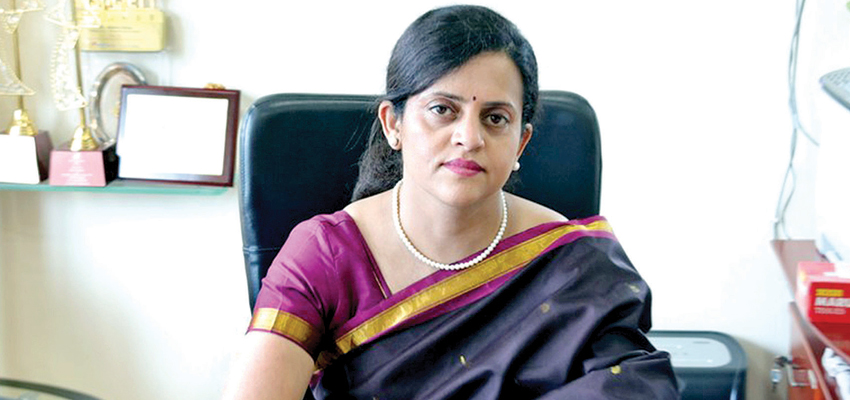
Ashwini Bhide, Additional Municipal Corporation of Greater Mumbai (MCGM), got her first assignment with infrastructure development when she was appointed as Additional Metropolitan Commissioner of Mumbai Metropolitan Region Development Authority. Thereafter, she came in the limelight when she took over as Managing Director, Mumbai Metro Rail Corporation as she dynamically spearheaded the construction of the metro with a fast pace. Presently, she is in a sense Corona Warrior as she is in charge of the Covid-19 war room and transparency through the digital platform, as Mumbai battles the Covid challenge being one of the hot spots of the pandemic, in the country. Working at the helm of government machinery, especially in a pandemic situation calls for a greater sense of duty, urgency and agility, reveals Ashwini Bhide, Additional Commissioner of Municipal Corporation of Greater Mumbai (MCGM). Be it ensuring citizen compliance to Covid containing measures, adopting and implementing technology, ensuring integrity and availability of data, alacrity and effectiveness of the field staff, the complexity and demand of the situation calls for a greater level of responsibility. All this, while being more sensitive and responsive
It is the responsibility of the government and especially the municipal corporation to deal with the COVID-19 situation because they are the first point of response. We have to participate in this process with positivity. It’s part of our job and duty. In addition to that, it should be rendered with diligence, both with a sense of duty and urgency and with caution. As an officer, your presence should be felt on the field because there are already so many frontline workers who are risking their lives and health and are working on the field. So, their morale should also be boosted. You can’t keep yourself away from the field. We need to be on the field motoring their work and boosting their morale. We need to monitor all the aspects check if they are wearing the masks and gloves, take care of the hygiene, see that everyone is following the rules and maintaining social distance. As this is the new normal, we need to see that harmony is maintained. And then manage our job.
Due to this situation, 90 per cent of the meetings are happening on video conferencing. Slowly we learnt how to make use technology more efficiently. Because participation has to be 100 per cent, people don’t have any excuses. The meeting starts on time and finishes on time. These are more result-oriented meetings. This was the main change that was imposed. And technology has come in very handy.
“As an officer, your presence should be felt on the field because there are already so many frontline workers who are risking their lives and health and are working on the field’’
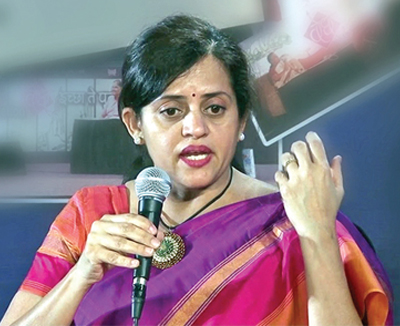
The focus is of course COVID. COVID related duties assigned to me, especially managing the war room, all the data, ensuring all the data is uploaded properly over various government platforms and made available to the public for viewing. I need to ensure that the data is perfect with minimum errors. Data comes from different verticals. So, all possible technology intervention has been thought of. Help has been sought out from our technology partners, the IT consultant. And there were many pro bono contributions from various data analytics and technology companies who also helped us. All this is done in a very focused way. And we evolved over a period of time. After three months, we have a much better handle of the situation and we are in a position to use the data effectively to make a prediction modelling.
This pandemic is such that your response time has to be minimum. Everything is linked to finding one positive case. The moment you find that you have to find the high risk contact. Then create a containment zone. They have to be quarantined, either at their home or shifted to institutional facilities. You have to continuously monitor the status of the high risk contact and as well as the positive case. Because over 14 days there could be change in the health status. Accordingly, you need to do the needful. All this is very dynamic and we need to be continuously on the go. The field staff have to be continuously working, be very alert and act with minimum response time. It’s a long process. We need our machinery to be very effective in the shortest possible time and get a better outcome. Accordingly, we brought in a lot of changes and got a lot of improvement in the system. Like the way we set up the ward level control room, then we had the war room coordinator, and then again use technology to handle the data in a much better way. This is a constantly evolving process which we are reviewing minutely.
“The pandemic has taught us to be sensitive and aware of our overall health, stamina and immunity’’
The government system has become so hightech, efficient and working on its feet because the situation is such. During the normal peacetime situation the urgency is not felt. Here, you have to be extremely sensitive and responsive, and at the same time you need to have clean data, not only for the purpose of transparency but also for analysis, as that will help better resource planning. You need to understand what’s happening on the ground and work accordingly.
The pandemic has taught us to be sensitive and aware of our overall health, stamina and immunity. You need to take care of your health and well-being because if your underlying health and fitness is sound then it will become easier to handle the situation. We need to regulate our daily routine, which includes better dietary habits, fitness regime plus mental stability. One of the biggest personal lessons is to have a well balanced life. Secondly, as we are part of the government, we cannot escape the situation, we need to be at the forefront of this fight. Once that understanding is there, you learn to deal with it. You take care of your basic things; you follow stringent regulations related to your behaviour and habits and with that you can lead a normal life. Otherwise, nothing has changed for us working at MCGM. It’s a usual office and usual life for us. The only thing that has changed is that we have to maintain social distance and minimise your physical contact with people, and still continue with your job.